“I got you good, you ****er!”
– Officer Rod Farva
Farva
[Far-vuh]
– noun
1. A large gulf between the perceived cleverness/effectiveness of an action and the actual effectiveness, often the result of self-delusion on the part
of the prankster. Best demonstrated by Officer Rod Farva of Super Troopers,
who once “got” a fellow officer by placing a bar of soap in his coffee.
I played a bunch of TSE drafts before the recent downtime, and my experiences in those drafts reminded me how much players love the idea of “getting” another player. Any time they wanted to put a button on a game with what they saw as a key play, it was the same song and dance. With a Cheshire grin, they tapped mana and rolled their spells out with all the self-satisfaction of Tony Stark demonstrating a new ballistic missile.
“Get ya!”
But quite often, they weren’t getting me.
I don’t mean “not getting” as in “not comprehending.” I mean, they weren’t
getting
me with these plays, as in, putting me at a disadvantage. I don’t blame them for trying – nothing feels better than leaving an enemy landless, cardless, helpless, hopeless, and unemployed in Greenland. And hey, sometimes they
did
get me:
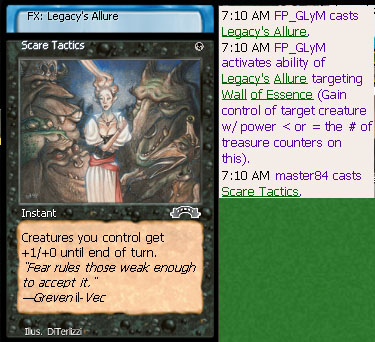
My first pick (fourth pick, actually, since people are on crack) trading with some guy’s…well, I don’t know what. Non-pick? Is that what we should call it? Scare Tactics is one of the worst, least impactful cards in the entire block, so to get value out of it like this (I was going to swing for a ton but had to say “go” instead) is a nice coup.
I want to send out a message.
Guys, when you’re sitting there all smug, basking in the afterglow of “getting” someone, thinking that you’re two steps ahead of the manager and taking tax-free money out the register, take a second look and make sure you actually got ‘em.
I was recently playing in a TSE draft and ended up paired against a pretty aggressive R/B deck in round 2. After we split the first two games, he was on the play in the third, and being on the play in TSE isn’t like being on the play in SOM Sealed, where you mulligan once, your opponent plays a Wall of Tanglecord, and you just want to kill yourself. Being on the play in TSE is actually good, and my opponent used it to his full advantage:
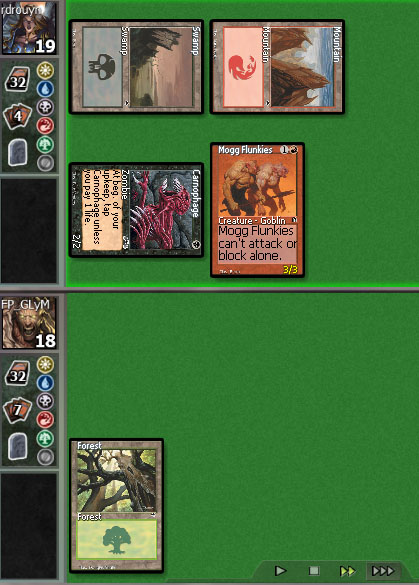
That’s me on the bottom with just one lonely Forest against the most aggressive start in the format. I was lucky enough to have a couple of plays, though, and when he missed his three-drop, I was feeling a glimmer of hope behind Canopy Spider and Spike Worker. Alas, he’d been sandbagging me. The game nearly ended on the spot when he tapped mana at the end of my turn for
this
heater:
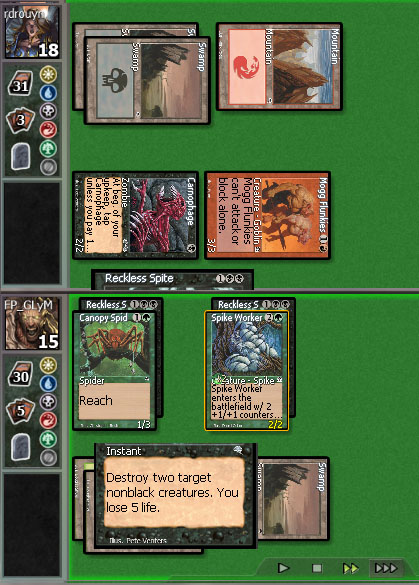
So both of my creatures died, and he was beating down for another five points. Things weren’t looking great for me, and if he’d played even an average man (Flowstone Giant, say) on his fourth turn, it likely would’ve been over. Luckily for me, he bashed and passed, and I summoned the card that would turn the game around:
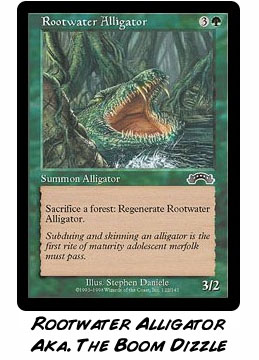
Now, I don’t know what it is about Rootwater Alligator, but the people I play against in the TSE queues constantly make mistakes against him, throwing games away like Lindsay Lohan discarding a court-ordered tracking anklet. It’s like a madness overtakes them. It happened so often that the images of gator-haters are burned into my recollection – I can still remember the lines in their haggard faces, their haunted eyes. These were broken, drunken men with no lives to go back to. At first, I didn’t understand why they were making the strange plays they were making, but it eventually crystallized.
They were trying to
get
me.
I blame Wizards of the Coast. The Renton slingers have been printing stepped-on, off-brand land destruction for so long that TSE-grinding fiends would pawn their mama’s whole living room for just one hit of 1996-era sweet Georgia Brown. I can hear them now:
“If land is so precious that Armageddon, the biblical end of the world, would have to actually
happen
for the card of the same name to be reprinted, the sacrifice of a Forest must be a great hardship indeed! I want some of those WMDs. Just one hit. Just one hit to soothe the pain. I want to spend two, or one, or even
zero
mana and see an enemy land disappear. Come on, can you hook me up? Man, I’ll (edited) your (edited)!”
Next thing you know, they’re alpha-striking and binning Trained Armodons and Flowstone Hellions without a care. They just want to fix. The euphoric high that floats through their veins when a Forest disappears is the only thing they crave.
“Got ya” come the rub-ins, even as their eyes are rolling back into their heads. It’s the newest high for players who want instant gratification.
Casting Natural Spring? Heck, every kid does a little of that. Harmless fun.
Chumping at twenty? Well, who doesn’t like to get a little wet? Give ‘em a break.
Bolting the face on turn 1? You can make a pretty Lava Spike good deck doing just that, Dad. Your old road is rapidly fadin’. Please get out of the new one if you can’t lend a hand.
All those old scrub amusements are just gateway drugs, small potatoes compared to sniffing Gator.
Let’s return to our case study. I had just cast Rootwater Alligator, and when my opponent went straight to combat on the next turn, I could just see the wheels turning in his head. Clearly, he fancied himself the Dread Pirate Roberts to my Sicilian, ready to match wits with death on the line.
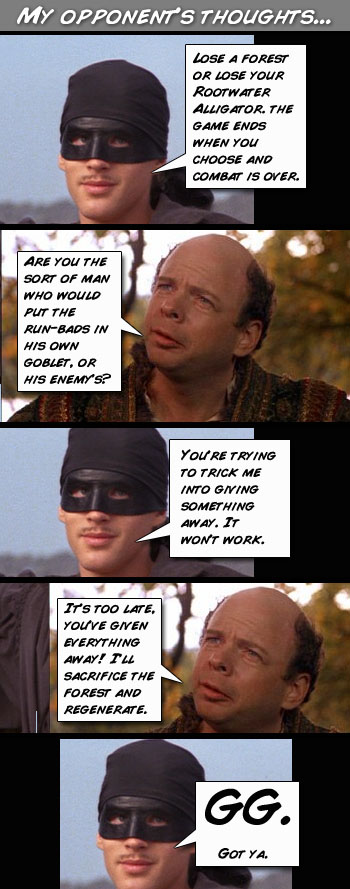
There are thousands of players out there who think the choice between a Rootwater Alligator death and losing a Forest is Magic’s equivalent of the Kobayashi Maru – a no-win scenario from which hapless foes will be helpless to extricate themselves. It’s the only way to explain the stuff these guys do. Here’s what my opponent did, for example:
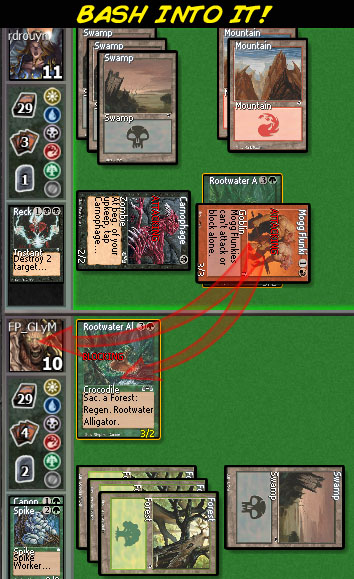
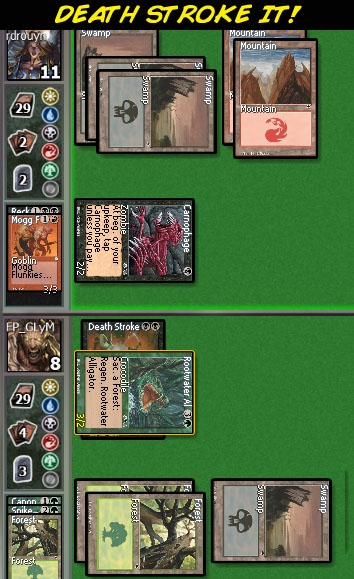
Oh look, a bar of soap.
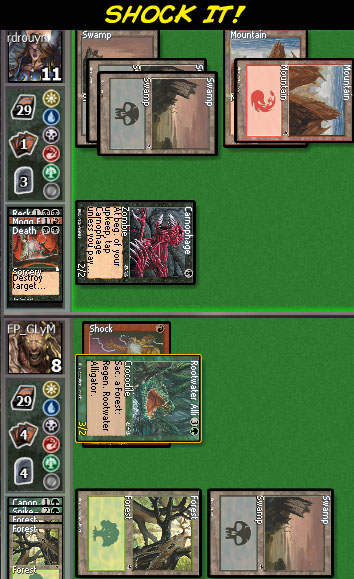
He sure was doing a good job of destroying my land. BB to destroy target Forest? That’s Sinkhole, and everyone knows how overpowered that is. R to destroy target Forest? Even better than Sinkhole!
Why would he not just Shock my guy and serve? Because he wanted to
get
me, that’s why. He couldn’t wait to put me between a rock and a hard place. That’s why he let me block his Flunkies and sacrifice that extra Forest. He wanted to see who would blink first, and he wanted to break me.
If he just Shocked and bashed, he had a good chance to win, even with no further creatures in hand. Instead, he chose a game of chicken. And you don’t want to play chicken with me when I have a Rootwater Alligator. I’ll sacrifice down to zero Forests every time. That gator is going to become your white whale. You’re going to have to run me out of timber and then do something like this:
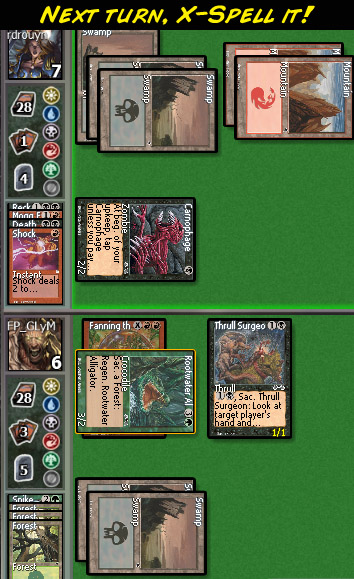
I could’ve sworn I heard my opponent exhale with relief, like he’d just driven a stake through the heart of the world’s last vampire.
For those keeping track at home, I traded this:
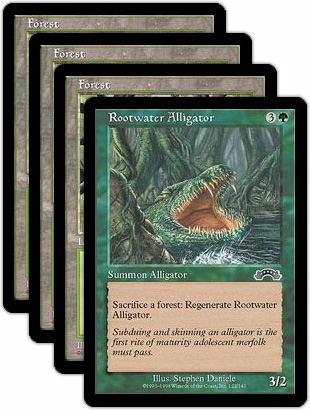
For this:
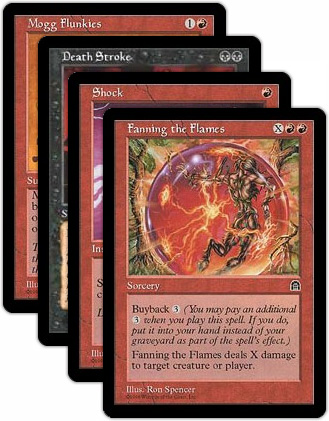
You don’t have to be Medina to give that exchange the ol’ thumbs up. A middle-of-the-road pick and three lands for two surefire first-picks, a high-pick removal spell, and a 3/3 that had been stealing my lunch money.
My next play was a Vampire Hounds, and I went on to win the game. Pretty amazing, huh? I beat Reckless Spite, Fanning the Flames, Shock, Death Stroke, Carnophage, Mogg Flunkies on the draw and didn’t even cast a noncreature spell. What’s even more amazing is that this example is one of at least a half dozen Rootwater-related punts that I saw in the 8-9 TSE drafts in which I participated.
Here’s the practical advice portion of the column.
Stop throwing games away by trying to kill Rootwater Alligator. Tempest is going appear in the Nix Tix queues again at some point, and this advice will be most applicable there, but I’m sure the idea is useful regardless of what format you’re playing. Limited decks have 16-18 land in them, and Tempest decks especially are filled with two-drops and three-drops.
Nobody cares about having to sacrifice a Forest. (Great prank, Farva.) You’re not “getting” ‘em. A player that bins a Hill Giant in order to Stone Rain his opponent is just screwing himself out of tempo and cards. Rootwater Alligator wouldn’t be a better card if it were simply “G: Regenerate,” and players who wrinkle their noses at land-fueled regeneration should reevaluate how they look at the early turns of their Limited games. “Sacrifice a Forest: Regenerate this” is not a drawback. It’s way better than “G: Regenerate” because you can cast Rootwater Alligator on turn 4 and start trading Forests for creatures immediately.
Throwing away a creature to knock your opponent back down to three land is a terrible idea, as he’ll likely just untap and lay a land and then cast Spirit-en Kor. Or Flowstone Giant. Or Dream Prowler. Or hey, maybe he doesn’t get a land and just casts Cloud Spirit, Grollub, or Tempting Licid. Many TSE Limited decks don’t really have five- or six-drops, but they play tons of twos and threes. Most likely, a given opponent is just going to untap, play something, and sit on his Rootwater Alligator again, thankful for the opportunity to trade a Forest (of which there are probably 8-10 in his deck) for an attacking beater.
I understand the reason that middle-level players enjoy killing Rootwater Alligator. When they do it, they feel like they’re grinding their opponents down or gaining some small, attritional advantage. They have this image in their heads of a frustrated magician on the other side of the table, huffing and puffing with disgusted, mana-shy exhalations, at a loss to get his hand of cards deployed onto the battlefield for want of that one crucial Forest. They look at their attacking creatures and the enemy Rootwater Alligator and see a Smokestack that will eventually leave the opposition with zero permanents.
It’s time to “just say no.”
What’s really happening every time some rube burns a card on the Alligator is that his opponent is sacrificing a Forest to cast Inquisition of Kozilek (if he used a removal spell) or Lightning Bolt (if he attacked). Don’t get me wrong – it’s perfectly fine to bash into the Gator if there’s more gas on the way, and you should (as my opponent in the example above should have) feel free to Shock the Gator out of the way if you have game-ending damage on the horizon. But other than that, it’s correct to just hang back and develop your board, just the same as if the Gator were a Cudgel Troll with G open.
This probably seems obvious to a lot of you out there reading, but people don’t treat a Rootwater Alligator the same way they’d treat a Cudgel Troll and just bash into it. This is usually wrong. By attacking into a Rootwater Alligator just to put an opponent to the test and present them with a choice, well…it’s like casting Browbeat. The tough opponents aren’t idiots – if sacrificing the land is going to screw them, then they won’t do it, and they’ll untap and drop a Spined Wurm. They can accomplish this either by taking the damage from your attack or simply declining to regenerate the Alligator. If they
do
have plays, they’re going to sacrifice the land, and you’re going to lose an attacker. In some cases (as I’ve shown you), it’s surprising how much land an enemy can afford to lose.
Assume your opponents can manage their Gators and don’t give you the luxury of a choice. It’s probably not even worth it to pull “fancy” moves like casting Dark Banishing on the Gator after they block and try to regenerate. All that does is turn attack damage into a Stone Rain. If a non-moron opponent is sacrificing a Forest, they can probably afford to do it.
Why is it that rubes can’t resist the song of the Gator? It’s because they’re addicted to false, incremental advantages that are actually terrible trades and have had it drummed into their heads that mana screw leads to easy wins. Furthermore, design and development articles have conditioned them to believe that good land destruction is more dangerous than anthrax. What these players don’t realize is that mana screw isn’t a choice, but Rootwater regeneration certainly is, and the only time a player is going to regenerate Rootwater Alligator is when it’s in his best interests. Players like this have been Vindicating land for years, never realizing it was training them to lose to the Gator.
While I’m on the subject, if you’re playing terribly against Rootwater Alligator, chances are you’re playing terribly
with
it as well. Sacrifice those Forests!
So, how can we apply these principles to something more relevant? Well, we’re talking about general skills that I hope you’ll be able to apply elsewhere. Though most people don’t even know that the card exists, Rootwater Alligator is one of the most skill-intensive cards in TSE block in terms of managing both hand and game state, and the lessons a player can take away from playing with and against the card can’t help but lead to tighter Limited play.
In SOM, the closest allegory is probably when an attacker offers a loose combat trade that will take his opponent off of metalcraft or kill a two-mana Myr or Palladium Myr. This is just another Browbeat – the only way the trade is going to occur is if the guy is just going to untap and metalcraft up again, and/or cast Razor Hippogriff, or if he had nothing good to cast in the first place. Any of these three things makes the offer of Painsmith for Silver Myr look pretty foolish. Of course, relative to the amount of nonsense going on in TSE, these moments are few and far between. If Silver Myr had text reading “Sacrifice a land: Regenerate Silver Myr,” then people would be slamming Vulshok Replicas into the red zone like there was no tomorrow.
Every Limited format has its Browbeats. Basically, stop casting them. Cast Lightning Bolts instead. When you offer a trade, think about what you’re essentially trading, and whether it gains you some sort of advantage. Don’t lose sight of what’s important. Don’t go in against a Sicilian when death is on the line. And for the love of god, when TSE comes back to Magic Online, don’t play chicken with Rootwater Alligator.
Geordie Tait
FP_GLyM on MODO
Geordie_Tait
on Twitter
